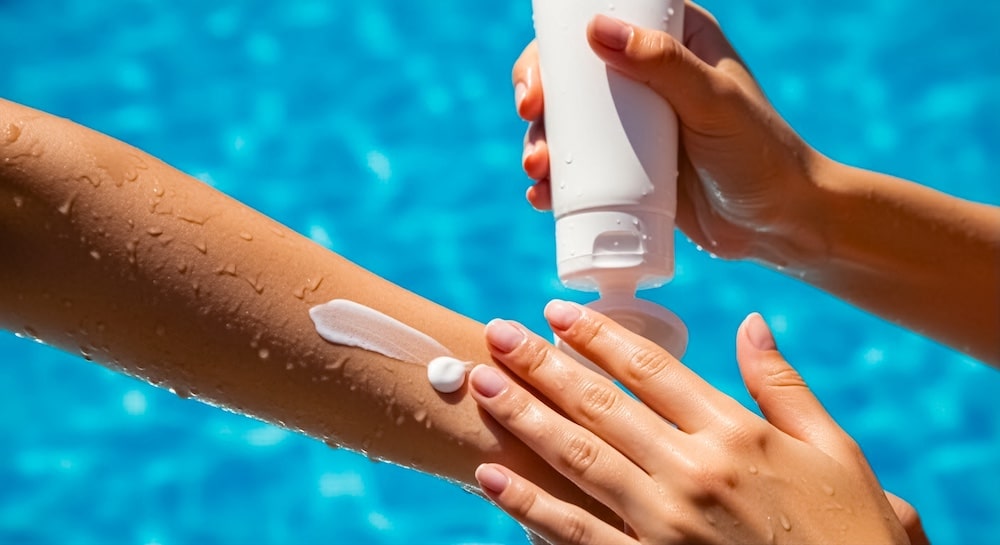Sunscreen is one of the most essential tools for protecting your skin from the sun’s harmful rays. It helps prevent sunburn, premature aging, and even skin cancer. However, it can do more harm than good for people with an allergy to sunscreen. You may have a sunscreen allergy if you’ve experienced redness, itching, or a rash after applying sunscreen.
This allergic reaction can be confusing and frustrating, especially when trying to do something healthy for your skin. Fortunately, by learning to identify what is causing the reactions and working with your local allergist, you can stay protected without discomfort.
What Is a Sunscreen Allergy?
A sunscreen allergy is an allergic reaction to one or more ingredients in sunscreen. These reactions are often caused by active chemical compounds that block UV rays or by inactive ingredients such as fragrances and preservatives.
Common ingredients that can cause sunscreen allergy include:
- Oxybenzone
- Avobenzone
- Octocrylene
- PABA (para-aminobenzoic acid)
- Artificial fragrances
- Parabens and other preservatives
Not everyone reacts to the same ingredients, so it is essential to identify the specific cause of your sunscreen allergy with an allergist.
Symptoms of a Sunscreen Allergy
The symptoms of a sunscreen allergy can resemble other skin issues, so it’s important to pay attention to when and where they occur. Most reactions develop in areas where sunscreen has been applied and often worsen after sun exposure.
Typical symptoms include:
- Redness and inflammation
- Itchy or burning skin
- Raised bumps or scaly patches on skin
- Blistering or peeling
- Swelling in sensitive areas like the eyes or lips
Symptoms may appear within minutes of application or after several hours of sun exposure. If you consistently experience these reactions after sunscreen application, it’s a strong indicator of a sunscreen allergy.
How to Diagnose a Sunscreen Allergy
Professional allergy testing is the only way to determine your sunscreen allergy. A board-certified allergist can perform a patch test, in which small amounts of topical allergens are occluded in place, usually on the back, for about 48 hours with an adhesive. Results are then read 5 to 7 days later after the patches are placed.
This type of testing is safe, non-invasive, and essential for pinpointing the ingredient or ingredients causing your sunscreen allergy. With a proper diagnosis, you can confidently begin making better skincare choices.
Finding Relief and Safe Alternatives
If you’re diagnosed with a sunscreen allergy, the good news is that you don’t have to avoid sunscreen altogether. Here are several steps you can take to manage your condition and protect your skin:
1. Use Mineral-Based Sunscreens
Switch to physical sunscreens that contain zinc oxide or titanium dioxide. These ingredients sit on the skin’s surface and reflect UV rays instead of absorbing them. They are much less likely to cause a sunscreen allergy.
2. Choose Fragrance-Free and Hypoallergenic Products
Avoid sunscreens with fragrances, dyes, or preservatives. Look for labels that say “fragrance-free,” “hypoallergenic,” or “for sensitive skin.”
3. Test Before Full Application
Apply a small amount of new sunscreen to a test area on your arm or wrist. Wait 24–48 hours to check for any reaction before using it more broadly.
4. Wear Protective Clothing
When possible, reduce your need for sunscreen by wearing sun-protective clothing, wide-brimmed hats, and sunglasses. Shade and physical barriers are effective tools in your sun protection strategy.
5. Seek Professional Guidance
If you’ve experienced repeated reactions or can’t determine which products are safe, it’s best to speak with a medical professional. Identifying your triggers is key to finding long-term relief from a sunscreen allergy.
Take the First Step Toward Relief!
Living with a sunscreen allergy doesn’t mean sacrificing sun protection. Understanding your triggers and choosing the right products allows you to enjoy the outdoors without fear of discomfort or skin reactions.
If you suspect you have a sunscreen allergy, don’t wait to get help from a medical professional. McGovern Allergy & Asthma Clinic’s experienced team of board-certified allergists can provide accurate testing, expert diagnosis, and personalized care to help you find relief. Whether you need patch testing, treatment for chronic skin reactions, or guidance on safe sun care products, we’re here to support you every step of the way. Schedule your consultation and take control of your skin health!

